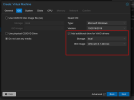Hi All,
I have a (maybe) weird issue on a pair of dell servers (PowerEdge R240):
When I try to boot the 6.5.11-4-pve kernel it freezes at "Loading initial ramdisk" - no further messages are showing up, the server isn't coming up.
The older Kernels work without issue (and one older HP Server in the infrastructure does not have this issue).
Any idea what could have gone wrong?
Thanks
Tobias
I have a (maybe) weird issue on a pair of dell servers (PowerEdge R240):
When I try to boot the 6.5.11-4-pve kernel it freezes at "Loading initial ramdisk" - no further messages are showing up, the server isn't coming up.
The older Kernels work without issue (and one older HP Server in the infrastructure does not have this issue).
Any idea what could have gone wrong?
Thanks
Tobias


